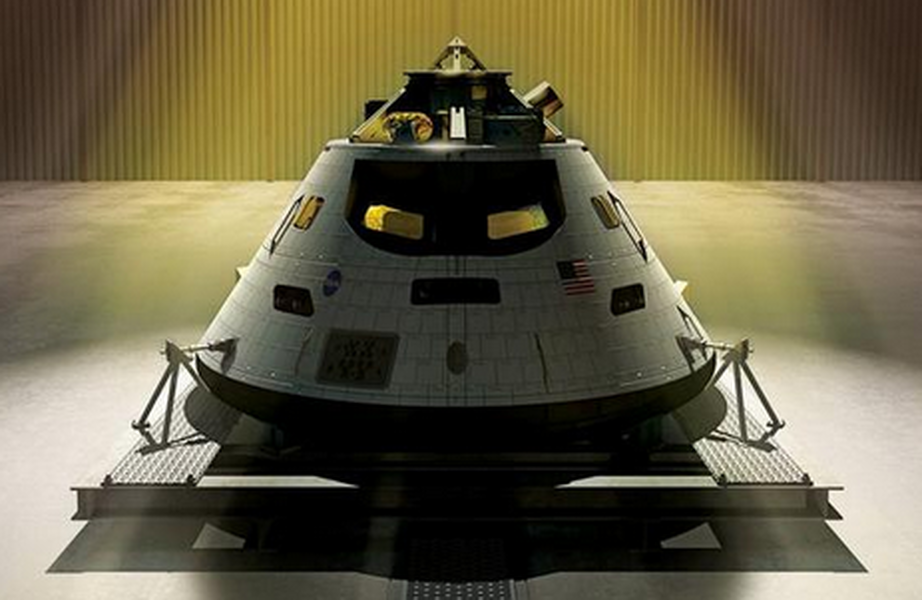Meet the most ambitious spaceship NASA has ever built


A free daily email with the biggest news stories of the day – and the best features from TheWeek.com
You are now subscribed
Your newsletter sign-up was successful
In the August issue of Smithsonian's Air & Space magazine, Tom Vanderbilt tests out NASA's new Orion spaceship, which will go deeper into space than any spaceship has before.
Vanderbilt toured a "low-fidelity mockup" of Orion at Lockheed Martin's Exploration Development Laboratory in Houston, and he describes the spaceship as resembling a Star Wars Stormtrooper's helmet.
Despite massive NASA budget cuts recently, NASA gave the lab $6.1 billion in 2006 for Orion's construction. When the program was canceled, Lockheed Martin created a contract, which has been extended to 2020, to build capsules for three missions. Orion, Vanderbilt writes, is "NASA's most ambitious crewed vehicle ever" and will "carry the human space program for the next 30 years." NASA hopes Orion will be able to complete everything from lunar exploration to Mars missions.
The Week
Escape your echo chamber. Get the facts behind the news, plus analysis from multiple perspectives.

Sign up for The Week's Free Newsletters
From our morning news briefing to a weekly Good News Newsletter, get the best of The Week delivered directly to your inbox.
From our morning news briefing to a weekly Good News Newsletter, get the best of The Week delivered directly to your inbox.
Orion will eventually reach speeds of 20,000 mph, Vanderbilt reports, and will be able to leave low Earth orbit, where the International Space Station is located. According to NASA's website, Orion's first test flight will occur by the end of the year, with Orion atop a Delta IV Heavy rocket. Orion's first exploration mission, which will be the first to combine Orion with NASA's new Space Launch System, is scheduled for 2017.
Check out the Orion capsule in the image below. --Meghan DeMaria
A free daily email with the biggest news stories of the day – and the best features from TheWeek.com
Meghan DeMaria is a staff writer at TheWeek.com. She has previously worked for USA Today and Marie Claire.
-
 Why are election experts taking Trump’s midterm threats seriously?
Why are election experts taking Trump’s midterm threats seriously?IN THE SPOTLIGHT As the president muses about polling place deployments and a centralized electoral system aimed at one-party control, lawmakers are taking this administration at its word
-
 ‘Restaurateurs have become millionaires’
‘Restaurateurs have become millionaires’Instant Opinion Opinion, comment and editorials of the day
-
 Earth is rapidly approaching a ‘hothouse’ trajectory of warming
Earth is rapidly approaching a ‘hothouse’ trajectory of warmingThe explainer It may become impossible to fix
-
 Blue Origin launches Mars probes in NASA debut
Blue Origin launches Mars probes in NASA debutSpeed Read The New Glenn rocket is carrying small twin spacecraft toward Mars as part of NASA’s Escapade mission
-
 Dinosaurs were thriving before asteroid, study finds
Dinosaurs were thriving before asteroid, study findsSpeed Read The dinosaurs would not have gone extinct if not for the asteroid
-
 SpaceX breaks Starship losing streak in 10th test
SpaceX breaks Starship losing streak in 10th testspeed read The Starship rocket's test flight was largely successful, deploying eight dummy satellites during its hour in space
-
 Rabbits with 'horns' sighted across Colorado
Rabbits with 'horns' sighted across Coloradospeed read These creatures are infected with the 'mostly harmless' Shope papilloma virus
-
 Lithium shows promise in Alzheimer's study
Lithium shows promise in Alzheimer's studySpeed Read Potential new treatments could use small amounts of the common metal
-
 Scientists discover cause of massive sea star die-off
Scientists discover cause of massive sea star die-offSpeed Read A bacteria related to cholera has been found responsible for the deaths of more than 5 billion sea stars
-
 'Thriving' ecosystem found 30,000 feet undersea
'Thriving' ecosystem found 30,000 feet underseaSpeed Read Researchers discovered communities of creatures living in frigid, pitch-black waters under high pressure
-
 New York plans first nuclear plant in 36 years
New York plans first nuclear plant in 36 yearsSpeed Read The plant, to be constructed somewhere in upstate New York, will produce enough energy to power a million homes
